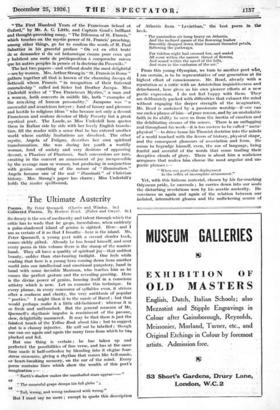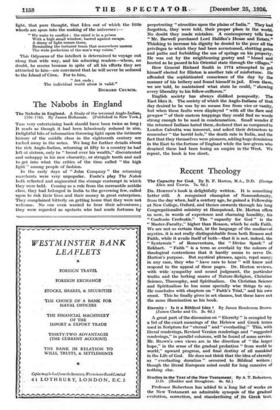The Ultimate Austerity
Or
So dreary is the sea of mediocrity and talent through which the critic has to wade that -he gasps, incredulous, when suddenly a palm-shadowed island of genius is sighted. Here—and I am as certain of it as that I breathe—here is the island. Mr. Peter Quenncil, a young poet with a second slender book, comes richly gifted. Already he has found himself, and over every poem in this volume there is the stamp of the master- hand.. They all have a quality of spiritual joy—that saddest beauty, sadder than star-bearing twilight. One feels while reading that here is a young hero coming down from another world into our intellectual and emotional purgatory, hand in hand with some invisible Mantuan, who teaches him as he comes the perfect gesture and the revealing greeting.. Here is the divine power of genius, housing itself in a conscious artistry which is new. Let us examine this technique. In every phrase, in every concourse of syllables even, it strives after a coolness and clarity, the very antithesis of popular " poetics." I might liken it to the music of Ravel ; . but that would perhaps _make it a little old-fashioned : whereas it is so fresh and unthumbed. But the general measure of Mr, Quennell's rhythmic impulse is reminiscent of the pavane, slow, delightfully mannered. It may be that there is just the faintest touch of the Yellow Book about him ; but to suggest that is a clumsy injustice. He will not be labelled ; though one can see again and again the many trees from which he has plucked and fed. But one thing is certain ; he has taken up and perfected the possibilities of free verse, and has at the same time made it half-orthodox by blending into it elegiac four- stress measures, 'giving a rhythm that comes like bell-music, or- heart-breaking memory, on the ear of the mind. Every poem- contains lines which show the wealth of this poet's imagination :— • " Earth's shadow makes the marshalled stars appear— Or
" The mournful grape droops his full globe ",;
" Toil, wrong, and wrong embraced with wrong."
But I must say no more ; except to quote this description of Atlantis from " Leviathan," the best poem in the book.
" The passionless air hung heavy on Atlantis,
And the inclined spears of the flowering bushes Smoothly dropped down their loosened threaded petals, Softening the pathways.
For tideless night had covered her, and sealed All scent within the narrow throat of flowers, And sound' within the navel Of the hills, And stars in the confusion of the air."
- From this young Olympian, we turn to another poet wfioi I am certain, is to be representative of our generation at its-
highest effort of consciousness. Mr. Read, already with a reputation as a critic with an Aristotelian inquisitiveness and detachment, here gives us his own pioneer efforts at a new poetic expression. I do not feel happy with them. They are deliberately packed with difficulties that exhaust the mind without engaging the deeper strength of the imagination, Mr. Read is sustained by a passionate worship—if one can use such a phrase of him—of pure reason, and by an unshakable faith in its ability to save us from the inertia of emotion and the debilitating steams of the senses. There is an unflagging zeal throughout his work—it is too austere to be called " meta- physical "—to drive home his Thomist doctrine into the minds of a world touched with the fevers of history, physical shape, and the consequent glamours of association and form. He seems to begrudge himself, even, the use of language, being fearful and scornful of the words that come trailing their deceptive clouds of glory. There is about him a malicious arrogance that makes him choose the most angular and un- poetic phrases :-
" When one particular deployment
Is the reflex of incomplete attainment."
Yet, with this hideous material, chosen by his far-reaching Odyssean pride, he succeeds ; he carries down into our souls the disturbing revelations won by his ascetic austerity. He convinces us again and again of the relation between our isolated, intermittent gleams and the unflickering source of light, that pure thought, that Idea out of which the little whorls are spun into the making of the universes -
" We wake to conflict : the mind is in a prison
With a high small window, barred against escape. A decoy of light enters there, Beminding the tortured brain that somewhere unseen The wide perfection of the sun's way exists."
This Odysseus of the intellect is determined to voyage out along that wide way, and his admiring readers—whom, no doubt, he scorns because in spite of all his efforts they are attracted to him—are convinced that he will never be seduced to the Island of Circe. For to him,
" Art ends ; The individual world alone is valid."
RieliArtro CHURC1U



































 Previous page
Previous page